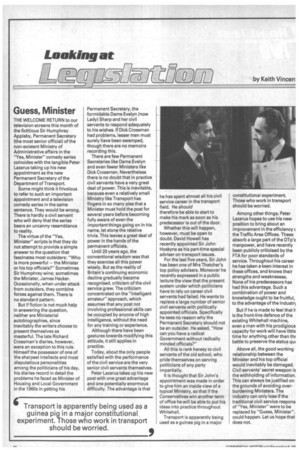Guess, Minister
Page 30

If you've noticed an error in this article please click here to report it so we can fix it.
THE WELCOME RETURN to our television screens this month of the fictitious Sir Humphrey Appleby, Permanent Secretary (the most senior official) of the non-existent Ministry of Administrative affairs in the "Yes, Minister" comedy series coincides with the tangible Peter Lazarus taking up his new appointment as the new Permanent Secretary of the Department of Transport.
Some might think it frivolous to refer to such an important appointment and a television comedy series in the same sentence. They would be wrong. There is hardly a civil servant who will deny that the series bears an uncanny resemblance to reality.
The virtue of the "Yes, Minister" scripts is that they do not attempt to provide a simple answer to the question that fascinates most outsiders: "Who is more powerful — the Minister or his top officials?" Sometimes Sir Humphrey wins; sometimes the Minister, James Hacker. Occasionally, when under attack from outsiders, they combine forces against them. There is no standard pattern.
But if fiction is not much help in answering the question, neither are Ministerial autobiographies, since inevitably the writers choose to present themselves as masterful. The late Richard Crossman's diaries, however, were an exception to this rule. Himself the possessor of one of the sharpest intellects and most disputatious personalities among the politicians of his day, his diaries record in detail the problems he faced as Minister of Housing and Local Government in the 1960s in getting his Permanent Secretary, the formidable Dame Evelyn (now Lady) Sharp and her civil servants to respond adequately to his wishes. If Dick Crossman had problems, lesser men must surely have been swamped, though there are no memoirs recording this.
There are few Permanent Secretaries like Dame Evelyn and even fewer Ministers like Dick Crossman. Nevertheless there is no doubt that in practice civil servants have a very great deal of power. This is inevitable, because even a relatively small Ministry like Transport has fingers in so many pies that a Minister must hold the post for several years before becoming fully aware of even the importantthings going on in his name, let alone the relative trivia. This leaves a great deal of power in the hands of the permanent officials.
Until 20 years ago, the conventional wisdom was that they exercise all this power wisely. But as the reality of Britain's continuing economic decline gradually became recognised, criticism of the civil service grew. The criticism concentrated on the "intelligent amateur" approach, which assumes that any post not involving professional skills can be occupied by anyone of high intelligence, without the need for any training or experience.
Although there have been gestures towards modifying this attitude, it still applies in practice.
Today, about the only people satisfied with the performance of the civil service are the very senior civil servants themselves.
Peter Lazarus takes up his new post with one great advantage and one potentially enormous difficulty. The advantage is that he has spent almost all his civil service career in the transport field. He should therefore be able to start to make his mark as soon as his predecessor is out of the door.
Whether this will happen, however, must be open to doubt. David Howell has recently appointed Sir John Hoskyns as his part-time special adviser on transport issues.
For the last five years, Sir John has been one of Mrs Thatcher's top policy advisers. Moreover he recently expressed in a public lecture the view that the present system under which politicians have to rely on career civil servants had failed. He wants to replace a large number of senior civil servants with politically appointed officials. Specifically he sees no reason why the Permanent Secretary should not be an outsider. He asked, "How can you have a radical Government without radically minded officials?"
All this is rank heresy to civil servants of the old school, who pride themselves on serving politicians of any party It is thought that Sir John's appointment was made in order to give him an inside view of a typical Ministry, so that if the Conservatives win another term of office he will be able to put his ideas into practice throughout Whitehall.
Transport is apparently being used as a guinea pig in a major Among other things; Peter Lazarus hopes to use his new position to bring about an improvement in the efficiency c the Traffic Area Offices. These absorb a large part of the DTp's manpower, and have recently been publicly criticised by the FTA for poor standards of service. Throughout his career he has taken a keen interest in these offices, and knows their strengths and weaknesses. None of his predecessors has had this advantage. Such a combination of power and knowledge ought to be fruitful, to the advantage of the industr) But if he is made to feel that h is the front-line defence of the existing Whitehall machine, even a man with his prodigious capacity for work will have little time for anything other than tht battle to preserve the status qu( Above all, the good working relationship between the Minister and his top official would inevitably be damaged. Civil servants' secret weapon is the withholding of information. This can always be justified on the grounds of avoiding overburdening Ministers. The industry can only lose if the traditional civil service respons of "Yes, Minister" were to be replaced by "Guess, Minister". could happen. Let us hope that does not.








































